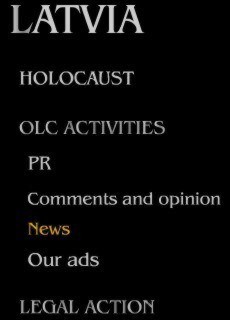|
RIGA (Reuters) - Veterans from a Latvian World War Two SS
division and their nationalist backers marched through
Riga on Friday, angering the country's large, Russian-speaking
minority and drawing a rebuke from its former imperial
master Moscow.
The marchers say their fight was for Latvian freedom against the Soviet Red Army
after mass deportations under dictator Josef Stalin. Critics
say it is wrong to honor men who fought on the same side
as Nazi Germany.
About a hundred counter-demonstrators,
mostly Russian-speakers who say Latvia discriminates against
them, watched in silence as several hundred grey-haired veterans
and young nationalist supporters walked past them through
the city centre.
Some of the Russian-speaking protesters
wore the striped uniforms of prisoners of Nazi concentration
camps. They also held placards with photos of people murdered
in the Holocaust.
"This resurrection of nationalism
like in the 1930s has been going on for the last 20 years
and we don't like it," said Grigory Drozdov, 69, a Russian-speaking pensioner.
Russia's foreign ministry called the
SS veterans "Hitler's henchmen" and said the "odious" march was an attempt to re-write history and whitewash Nazi atrocities.
"We believe that the Latvian
authorities' indulgence of the former legionnaires and the
attempts to rewrite history should be met with an appropriate
reaction from the international community," the ministry said in a statement.
Russia, proud of its World War Two
role and seeing the Soviet Union as having liberated Latvia
and the other Balts from the Nazis, has reacted angrily to
such events in the past.
The Latvian government had distanced
itself from the commemoration, an annual event which also
angers Jewish leaders. Police had warned it could cause trouble
but it passed off peacefully.
"We have come here to honor
our dead, it is very important to do that," said marcher Janis Johanson, 82, who said he was forced to join one of the Latvian
SS divisions at the age of 18 and fought in 1944-1945.
"If you did not join up
you were shot as a deserter. That was it. That was what happened
in a time of war," he said. Many Latvians also fought in the Red Army, showing how the small country
squeezed between two powerful neighbors.
Young men and women holding the national
flag on long poles flanked the marchers, who then laid flowers
at the Freedom Monument, a key symbol of Latvian independence.
Latvia's Jewish Community organization
issued a statement opposing the march. Ephraim Zuroff, a
Nazi hunter at the Simon Wiesenthal Centre, said men who
massacred Latvian Jews later joined the SS units, as well
as those forcibly conscripted.
"This is a horrible message
here. You are talking about people who wanted the Third Reich
to win, some of whom are mass murderers," he told Reuters.
ETHNIC DIVIDE
The Baltic state was left with a large
Russian minority after the collapse of the Soviet Union in
1991.
Though Latvia last month overwhelmingly
rejected making Russian a second language, the holding of
the vote was seen as a sign of discontent by the Russian-speakers
in the face of what some see as discrimination by the ethnic
Latvian ruling elite.
Many Russian-speakers also still feel
resentment they had to apply for citizenship of Latvia after
the Soviet collapse and that there are still 300,000 people
who have no citizenship, which means no right to vote or
take certain jobs.
Some Latvians see the Russian-speakers
as illegal occupiers who came during 50 years of Soviet rule.
But the march is also controversial
amongst Latvians and a poll of 750 people on Friday showed
49 percent were against it.
Prime Minister Valdis Dombrovskis
told all his coalition ministers to stay away, including
two nationalists from the All For Latvia-For Fatherland and
Freedom group.
The Foreign Ministry also said in
a statement this week that Latvia condemned the Holocaust
and totalitarianism.
All For Latvia-For Fatherland and
Freedom, the smallest of three ruling parties, are the main
backers of the march. Several of its 14 members of parliament
took part. yahoo.com
| 

